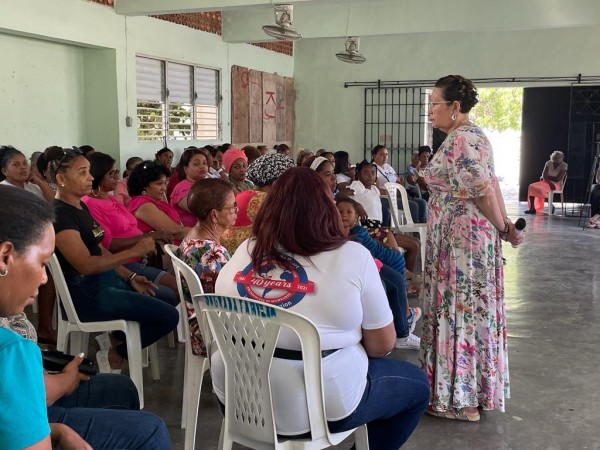
On Saturday, March 11, we celebrated Women's Day at La Sagrada Familia Parish in Sabana Yegua (Dominican Republic). By way of introduction, we offered a short reflection on the path that still lays ahead when we think about the defense of women's rights around the world. We wanted to emphasize that in many areas of our societies there is still a lack of equality between men and women, and that we (women) are the first who are called to fight tirelessly against this inequality.
We had the honor of having the presence of María González Edwards, a retired educator from the United States, originally from Puerto Rico, who shared with a group of sixty women a talk entitled “Becoming the owner of my own faith”. With her life as a testimony of pilgrimage through different situations of conflict and pain, as well as joy and reconciliation, she encouraged all the women present to empower themselves in their lives, to make their own decisions, always with God’s guidance. The talk, which was very emotional and experiential, gave rise to many questions. Good lessons were learned and fruitful reflections shared. We ended the evening with a warm applause and a typical Dominican snack.
Students of the sewing course of the Community of Saint Paul in Bogotá organize an exhibition with garments made by them
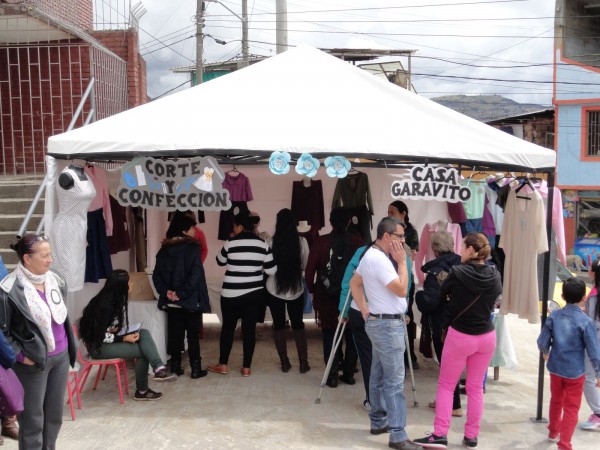
On August 5, the first exhibition of garments made by the women of the Sewing workshop that the Community of Saint Paul established a year ago in the south of Bogotá (Colombia), took place at La Resurrección parish. The exhibition was a very positive experience, both for the women who are part of the project, who were able to make their work known to others, and for the parish community, who had the opportunity to appreciate the fruits of the workshop. Several people, seeing the good quality of the exposed clothes, ordered women's dresses, blouses and jackets.
This exhibition has been carried out thanks to the perseverance and commitment of the group of women who, after a year of training, now arrive at the end of the first stage of the process. And they are already very excited about the next stage: establishing a productive cooperative through which the learning they have received can result in direct benefits for the families of these women. To all the participants in our sewing center, we want to say: congratulations, and let’s keep going!
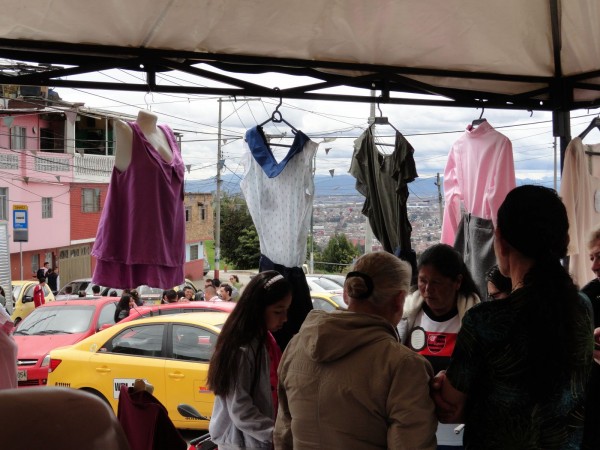
The Community of Saint Paul has established a Sewing Center in the neighborhood called Granjas de San Pablo in Bogotá, Colombia
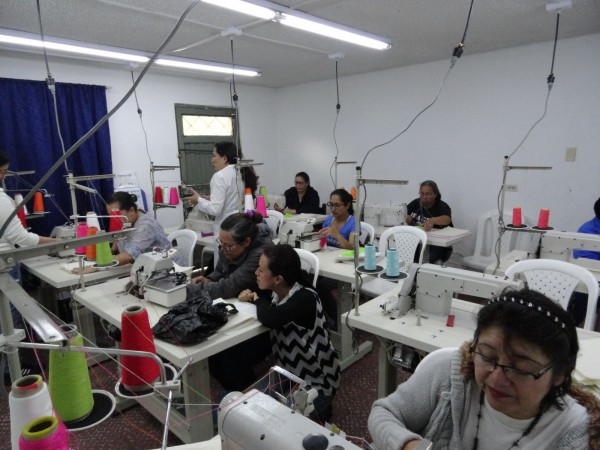
As an extension of the pastoral work and the development projects that the CSP is developing in the south of Bogotá, we have started a new program: the establishment of a training workshop for women, in which they are offered sewing classes.
After several meetings with women from the neighborhood who were interested in being able to receive formation in some field, so that in the future they could be able to help sustain their families, we decided that sewing was the best option. Once this decision was made, we started looking for the person who could give the courses, and we were fortunate to find an instructor who has been teaching dressmaking courses in different institutions in Bogotá for more than twenty years, and who was willing to offer her services. Then we acquired nine industrial sewing machines and we proceeded to establish the workshop in the premises of a neighborhood association in Granjas de San Pablo.
The first group of students is made up of 16 women. They registered with the goal of completing two semesters of training. Classes take place three days a week in the afternoon hours. When they finish the second semester, the CSP will help the participants that wish to organize themselves as a small company to producing clothing (blouses, skirts, underwear, sportswear ...). Then, using the same machines as the project, they will be able to start to market their products and thus help their families.
It is great to see the enthusiasm with which the students have welcomed this project, and also the atmosphere of camaraderie and solidarity that has been created between them. In February 2018, when the new school year begins in Colombia, we will start with a new group of students, while the first ones continue with their second semester of training.
From here we would like to thank all the institutions and people who with their contributions have helped us to establish this training center, and help us to maintain it.
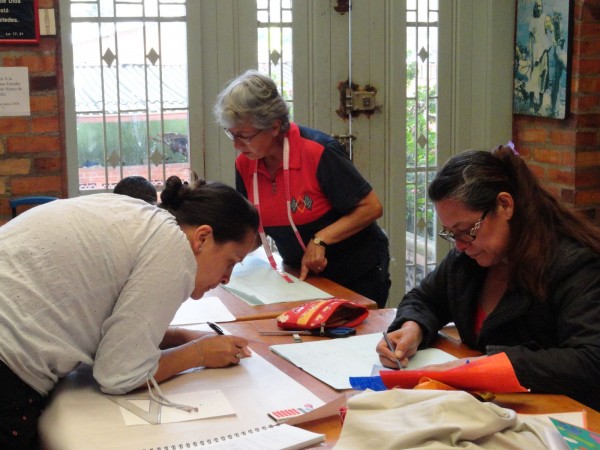
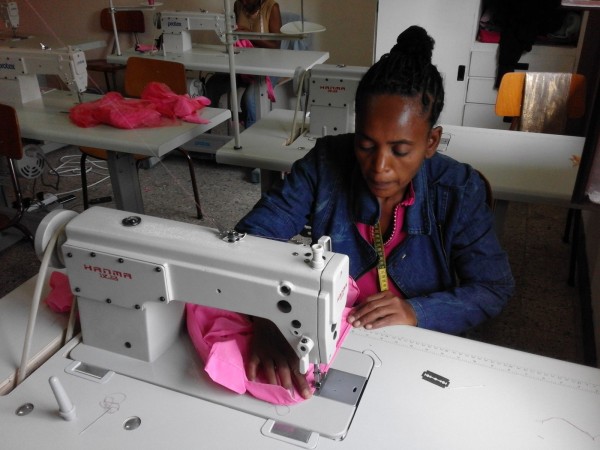
The Community of Saint Paul, through its courses of professional training, has assisted in the creation of a sewing cooperative in Meki, Ethiopia.
Last February, 45 students graduated from cooking, painting and sewing at our "Kidist Mariam" center. Then, ten of the young graduates of sewing classes decided to create, in our same center, a cooperative to make school uniforms. Uniforms are required in all schools in the country, and there are 15 schools, only in Meki. They began to work, and the first order they received was to produce 597 uniforms, for the community school in the neighborhood of Oda. In July the members of the cooperative took the measures to the students, and to this day they are finishing the uniforms, because the course will begin on September 28 and being such a big order, they are just time.
The word about this service has spread, and new orders have already arrived from other schools in the rural area. We are very glad about this new sewing cooperative, and we see that they will not run out of work!
The Difficulties of Higher Education Faced by Rural Women in Bolivia
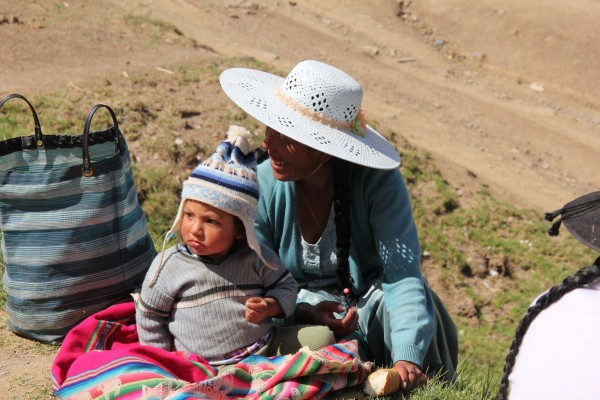
The scene repeats itself again and again: the father saying to his daughter, “Why do you need to continue studying if you already know how to read and write? That is enough to be a good wife. That's how it was for your mother, and you see her...proud of her five children.”
The daughter realizes that there is no real communication taking place. How can she convey to his dad the eagerness in her heart, this passion to continue her studies? If, after all, the friend who finished high school with her is already married and expecting a baby? Besides...studying agricultural science? A woman? Someone filled up your head with nonsense…
And so the story repeats itself. In Bolivia, the Community of St. Paul is promoting the development of rural women, trying to break some of the age old taboos. In Totora Pampa, where the Community carries out several development projects, little by little, youth are finishing high school, and some are encouraged and daring enough to undertake university studies.
There is no point in blaming the parents, who are in need of hands to help the family. It’s hard for them to imagine a future different from the one they had, in which they could not study. The adventure of going to a university is almost unheard of in their communities, let alone for women. “From time to time, a young man will leave and be successful, but not you, my daughter,” a father would say to his daughter, doubting her ability and fearing the difficulties and risks that she might encounter on her road to becoming a professional.
That’s how it was going to be for Martha, a women among many, who nonetheless was able to change the course of her future. She studies agriculture in a boarding school, far from her home. Martha was clear about her future and had planned, upon finishing technical school, that she wanted to continue her studies and earn an engineering degree. The process is slow and costly, and her environment is not exactly supportive of her dream. We, at the Community of St. Paul, do support women like Martha and hope that many more like her will obtain the professional formation that they are seeking. In that way, the story, the same old movie of resignation and lack of higher education for women of Bolivian communities, doesn’t have to repeat itself indefinitely.
The Community of Saint Paul Accompanies and Guides an Association of Women Weavers in the Altiplano of Cochabamba
The Association of Women Weavers of Totora Pampa has been in existence for three years already. It was formed with the idea of creating a space for training illiterate peasant women; the association began with fifteen members and currently has sixty-five. There, the women learn to weave and make warm clothing, especially for the children of their families. The families live at more than 3,400 meters above sea level, and the cold there is intense. At the same time, the association is also a privileged meeting place where women share worries and learn to listen to one another. The topics of their conversations are varied: domestic violence, the economy of rural communities, the effects of climate change, food security, migration from the country to the city and gender inequality. The women would not use these terms to describe the subject of their discussions, but they do cover these topics. In simple terms, they chat about machismo, early pregnancies, married youth, the abandonment of single mothers and other topics that worry them and directly impact the conditions in which they live.
The team of Community of Saint Paul that works with the women of Totora Pampa uses the topics that surface in these meetings to then prepare formal talks, through which they support the women, analyze the situations and seek alternatives to alleviate the region’s problems. The women take the first step, offering each other mutually support. Then, the team helps by offering the talks.
We are convinced that giving support to these peasant women is the best guarantee we can offer to help the development of their communities.
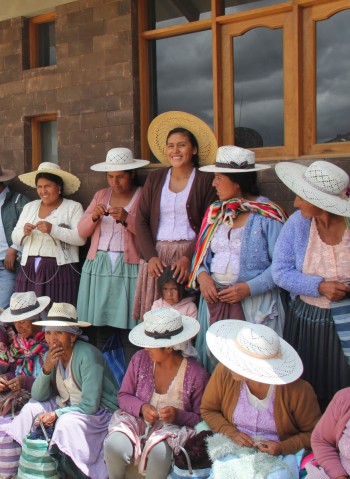
The Professional Training Center of Meki, Ethiopia, celebrates the end of the semester with a trip
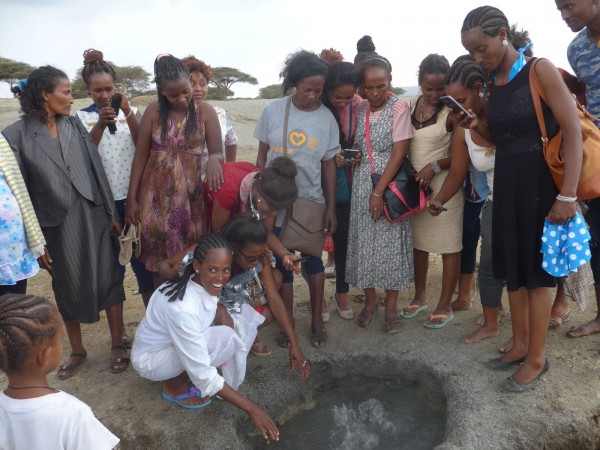
What better way to celebrate the end of the semester with our cooking, sewing and hairdressing students than to take a trip!
The city of Meki is located in the Rift Valley, in Ethiopia. Koka, Zway, Abiyata, Shala and Langano Lakes are all located along the 215 kilometers of highway that goes from Addis Ababa toward southern Ethiopia. We went to visit the flamencos, marabous and herons in Lake Abiyata and the thermal waters near Lake Shala. In spite of being only 85 kilometers away from Meki, our students had never visited the nature preserve in this area; some of them didn’t even know of their existence.
We boarded two buses with food prepared in advance at the Training Center. Our students were dressed so elegantly that it appeared that we were going anywhere but an outing to the mountains and lakes. A few telephones were prepared to photograph every moment of the outing. When it was time to walk on the trails, most of the students took off the elegant shoes they were wearing, and went barefoot. Along the way, one of our buses got trapped and stuck in one of the sand paths, and we had to wait a good while until the driver, with the help of local people, was able to get back on the road. While waiting, the other bus became a dance floor for those that preferred to dance rather than wait under a tree. After strolling and seeing camels, wild boars, ostriches, an endless number of flamencos and marabous, we ate together and washed the plates with hot water from a nearby creek (that had formed from the thermal waters).
The biggest surprise of the trip was to see the natural Geysers that had formed along the side of the lake. On holidays, the area is filled with people who put bags of potatoes and eggs in the water and eat them after they have boiled. I think on our next trip, we will do the same!
We enjoyed the day and the pleasant atmosphere that the students help create, laughing, talking, helping each other and experiencing the marvels of nature that are so close to Meki, their city. The outing was very positive, even though the next morning more than a few students missed class because they said they were exhausted from all the walking and dancing of the previous day!
Students enrolled in our center celebrate the completion of their formation in cooking, sewing and painting
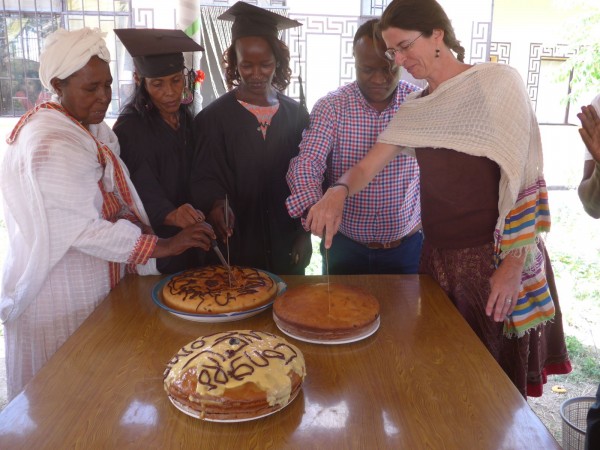
A year ago, the Community of St. Paul initiated a work training program for women and young people in the Vicariate of Meki, Ethiopia. María José Morales, the person behind this project, reports now the following:
«Saturday, February 18, was a great day for our training center... a real event! There aren’t cameras or videos or gestures or words that can express what the graduation meant for our first forty students. The week before graduation they created committees in charge of preparing the celebration: a teacher and three students from each course. The rest of us helped however we could, decorating the center, preparing songs, obtaining the graduation uniforms —that we just couldn’t do without— and setting up a big tent in which we could welcome our guests and prepare cookies, coffee and food for the 200 people who participated in the celebration.
On graduation day, the first to arrive were the heads of the committees to ensure that nothing was missing. Then, the students, wearing their uniforms, arrived with their families. For them, being able to graduate, to have a profession, to invite family and to be photographed receiving their certificate from the Bishop of the Vicariate of Meki and the director of the center... all of it, it meant more than we can imagine. These young people hadn’t finished their studies and had scarce work opportunities; now they graduated as cooks, seamstresses and painters. Some were already working, thanks to the training they had received. They were all radiant with happiness and enthusiasm.
Emabet —one of the students— thanked us for the opportunity the center gave her and many others to study a profession after having returned from an Arab country. When these students returned, they were rejected by their families and found no job opportunities. They were discouraged for not having achieved the “better future” that they had hoped to find when they emigrated. Emabet is now a cooking teacher at our center, and other students are now working in local hotels. The sewing students made their first delivery of uniforms to a nearby daycare center and have formed a cooperative in order to make the uniforms that are required in schools throughout the country. At the present time, we have an order for 500 student uniforms and 50 teacher uniforms.
It is difficult to communicate the happiness of the families who accompanied their relatives on such a special day, as well as our happiness after having worked so hard and with so much enthusiasm throughout the year to make this moment possible. We have all “graduated a little” with our students, and wish the best for them in this new stage that they begin their life as professionals».
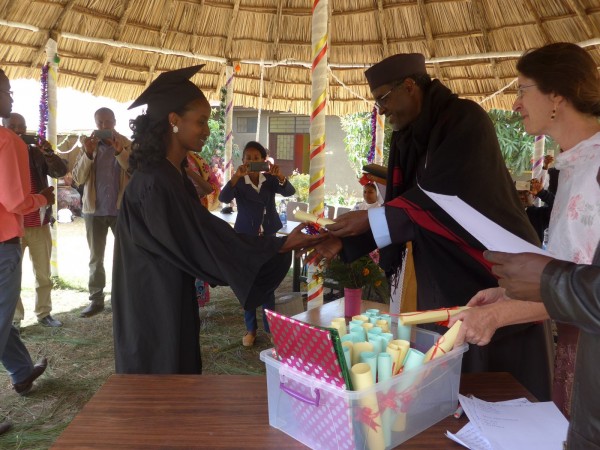
Youth who return to Ethiopia from Arab countries are trained in Meki at the center run by the Community of Saint Paul
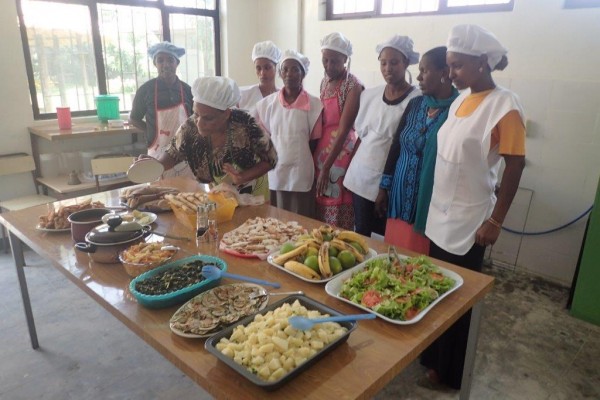
In August 2016 we began new cooking, sewing and hairdressing classes in Kidist Mariam Center, the training center that the CSP runs in Meki, Ethiopia. We also began Level II courses in sewing and cooking, and the number of students increased to 93. Over the course of 2016, we will have trained 160 women, and we celebrate that this can happen.
The majority of our students are young people who weren’t able to finish their studies, and now, due to their lack of training, do not have adequate jobs. Among them, we have a group of young 18 women who are back in Meki after having emigrated to Saudi Arabia or to Lebanon in search of work to support their families. In Ethiopia, many try this route to escape from poverty. However, in most cases, where they arrive to their destinations they find very different reality from what they expected: in the Arab countries they suffer all kinds of mistreatment and humiliations, and the opportunities are not as great as they thought.
Faced with this exploitation of immigrant women, Caritas International opened several shelters for young immigrants in the Arab countries. The young women who escape from these situations and arrive at the shelters receive psychological and material support and are supplied with documents so that they can return to their countries. Those who return to Ethiopia are received in a shelter in Addis Ababa. From there, they are connected with relatives, to try to reintegrate these young women back into their families. The work of reinsertion is complicated because many times they are rejected by their relatives. The families sent young, healthy daughters, filled of vitality, who many times return with babies and are psychologically very affected by the abuses they suffered during their journey.
The returned students who are at our center participate in training courses of sewing and cooking, while the Vicariate of Meki continues to work to reunite them with their families. In the classrooms they join other young people of their same age, many of whom lived through similar experiences. It’s amazing to see the interest they have in learning and their happiness at being treated with respect and valued for their talents. Upon seeing them, it’s hard to imagine the many difficulties they have endured in recent years.
Last Sunday, the owner of a new hotel near Meki invited us to eat at his restaurant so that he could show us his gratitude for his new cooks, Kasech and Zenafakech. They are two of our students in Level II cooking, both of whom returned from Lebanon. The food, service and attention we received were excellent. We were all very satisfied: our students, our boss, their cooking instructor and us.
We hope that, like Kasech and Zenafaketch, many other young women from our center can find good work. May they serve as an example so that those that continue thinking of emigrating to Arab countries know that, right here in Ethiopia, they also can have a good future. From the Kidist Mariam Center, we will continue working so that may be possible.
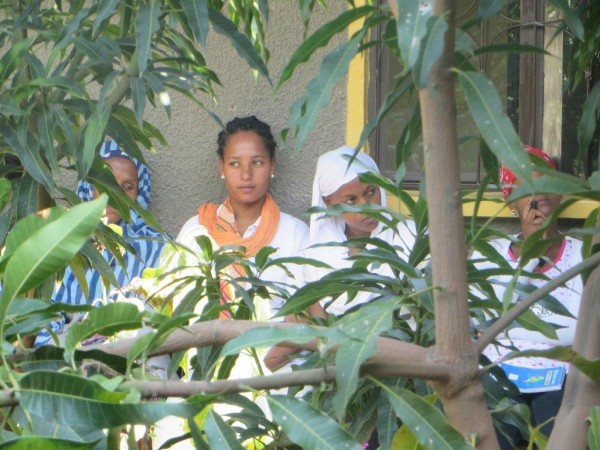
To spend years in one place, sharing experiences with its people and accompanying them in their personal processes, has its rewards. Deysi Rosa, for instance, is a great gift for us. We met her when she was barely three years old, and we had just arrived at the Totora Pampa Community in Cochabamba, Bolivia. Deysi, the second of five sisters, was always shy, responsible, hard working and endowed with a great interior strength. However, the family environment where she was growing up didn’t forecast success. Her older sister, at age 20, was already raising two children. Her younger sister didn’t want to study because her plans were, as she put it, “to find a husband while I am still young”.
Deysi, however, had this vague “something” that some people possess, which makes you think that they can really improve their odds, that they won’t accept for themselves a somber future. For years we saw the determination and will that Deysi put into her studies in spite of the fact that the majority of her classmates were abandoning the classroom and starting families.
When we asked her what she wanted in life, she would adopted a firm posture, in spite of her shyness, and would tell us that she would like to achieve more than just work the land and have children. She wanted to study and learn about other places. Her plan, though simple in appearance, was a great challenge: in order to achieve it, she needed to break cultural habits and overcome many economic barriers. The distance between Totora Pampa, in the mountains, and the big city of Cochambamba (where she would study) was not just geographic, but also economic and social.
Seeing her situation, and that of several girls from the same area that had approached our community, we decided to provide scholarships to six young women to study nursing at an institution for women from rural areas. The advantage of this institution is that it provides the students with a place to study, materials, food, schedules and living accommodations. The young people from rural areas can, in this way, overcome the previously mentioned obstacles and barriers and complete their professional formation in the best possible environment.
Today, Deysi is a full time student, and tells us how she takes full advantage of her time, because she knows that this opportunity is a gift. We, however, think that she is the gift. Her interior strength has opened a previously closed door, so that in the future other women from Totora Pampa may follow her footsteps.

Due to the great need for training for young women in Meki (Ethiopia), the Community of St. Paul has conceived, organized and started the Kidist Mariam Maakel, or “Saint Mary Capacitation Center”. With this new project we wish to help women who haven’t been able to finish their education to learn a profession in which they can work in a dignified manner and become self-sufficient. The center opened on February 1, and currently we are offering courses in cooking, sewing and painting (each lasting six months). At the inauguration of the center, the Bishop of Meki, Msgr. Abraham Desta, blessed the building and all who were present. Then, following the Ethiopian tradition, we prepared coffee and shared bread with the participants. The first group of students is comprised of 56 young women from Meki. We hope that they are able to develop the many talents and potential that they possess, and will keep you updated with news from the center.
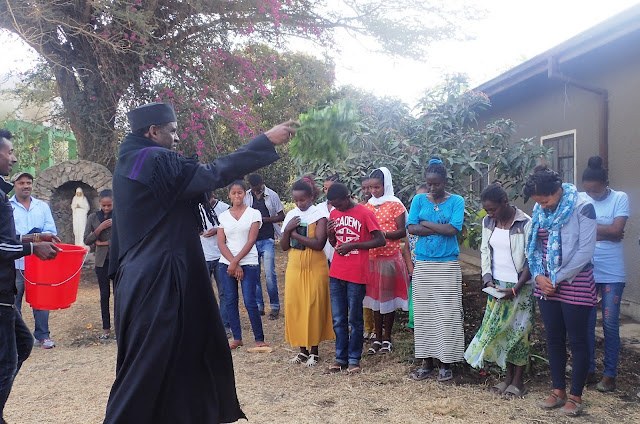 |
| Bishop Desta during the blessing of the new center |












